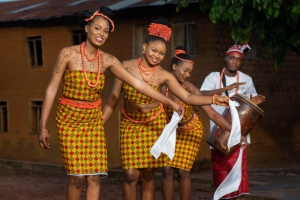Introduction
Tanzania is a land of rich culture, warm hospitality, and deep-rooted traditions. With over 120 ethnic groups, each with its own language, customs, and beliefs, Tanzania offers a vibrant cultural experience for travelers. Understanding local etiquette will enhance your interactions with Tanzanians and show respect for their way of life.
This guide covers essential local customs, including greetings, dress codes, tipping practices, and cultural sensitivities, to help you navigate social interactions with ease.
Respect for Elders
In Tanzania, elders hold a highly respected position in society. They are seen as sources of wisdom and guidance, and younger people are expected to show deference in their presence.
🔹 Proper Ways to Greet and Address Elders
✔️ When greeting an elder, it is customary to bow slightly or lower your posture as a sign of respect.
✔️ Use polite titles such as Mzee (respected elder) for older men or Mama (mother) for older women.
✔️ When shaking hands, use both hands or place your left hand on your right wrist as a sign of respect.
✔️ Let elders initiate the handshake—some may prefer a nod instead.
🔹 Showing Respect Through Language and Actions
✔️ Avoid addressing elders by their first names unless invited to do so.
✔️ Stand when an elder enters the room as a sign of respect.
✔️ Do not interrupt an elder while they are speaking—listen attentively and respond politely.
Greetings and Social Etiquette
Tanzanians are warm and friendly, and greetings are an important part of daily interactions. Taking the time to greet someone properly is seen as a sign of good manners and respect.
🔹 Common Greetings and Phrases
- “Jambo” (Hello) – widely used but more common in tourist areas
- “Hujambo?” (How are you?) – used in Swahili-speaking regions
- “Shikamoo” (A respectful greeting for elders) – The response is “Marahaba”
- “Asante” (Thank you) – “Asante sana” means “Thank you very much”
🔹 Social Interactions with Strangers
✔️ Tanzanians enjoy small talk before diving into business—be patient and engage in conversation.
✔️ When introduced to someone, a handshake is expected, and it may last longer than in Western cultures.
✔️ Friends may hold hands while walking—this is a sign of friendship, not romantic affection.
✔️ Public displays of affection between couples are uncommon, especially in rural and Muslim areas.
Dress Code
Tanzania has a modest dress culture, particularly in rural areas and Zanzibar, which has a strong Muslim influence. While big cities like Dar es Salaam are more relaxed, dressing respectfully shows cultural awareness.
🔹 What to Wear in Different Settings
✔️ Urban Areas: Casual clothing is acceptable, but avoid overly revealing outfits.
✔️ Rural Areas: Women should wear skirts or dresses below the knee, and men should wear trousers instead of shorts.
✔️ Religious Sites (Mosques & Churches): Women should cover their heads and wear loose-fitting clothes; men should wear long trousers and sleeved shirts.
✔️ Beaches: Bikinis and swimwear are fine on the beach, but cover up when leaving the shore.
Tip: In Zanzibar, wearing revealing clothing in town can be seen as disrespectful. A light scarf or shawl is useful for covering up when necessary.
Tipping Practices
Tipping is not mandatory in Tanzania, but it is highly appreciated in the service industry. Many workers depend on tips to supplement their income.
🔹 Standard Tipping Guidelines
✔️ Restaurants: 5-10% of the bill if service is not included
✔️ Taxis: Not required, but rounding up the fare is appreciated
✔️ Hotels: $1-$2 per bag for porters, $5-$10 per day for housekeeping
✔️ Safari Guides: $10-$20 per day, split among the group
✔️ Tour Guides: $5-$10 per day, depending on the length of the tour
Tip: Hand over tips with your right hand as the left hand is considered unclean in Tanzanian culture.
Cultural Sensitivities
Tanzanians value politeness, hospitality, and community. Certain topics and behaviors can be sensitive, so it’s important to be mindful in conversations.
🔹 Topics to Avoid
❌ Politics: Avoid criticizing the government or discussing politically sensitive issues.
❌ Religion: Tanzania is a mix of Christianity, Islam, and indigenous beliefs—be respectful of all.
❌ Wealth: Bragging about money or material possessions is considered rude.
🔹 The Importance of Family and Community
✔️ Family is central to Tanzanian life—expect to see extended families living together.
✔️ Elders are respected, and decisions often involve the whole family.
✔️ Community support is strong—locals help each other in times of need.
🔹 Hospitality and Accepting Food & Drink
✔️ Tanzanians love to share meals, and refusing food or drink can be seen as impolite.
✔️ If you’re invited to a home, bring a small gift (like fruit or sweets) as a token of appreciation.
✔️ Always wash your hands before eating, as many meals are eaten with the hands.
Local Festivals and Traditions
Tanzania has a variety of cultural festivals that offer a glimpse into local traditions, music, and dance.
🔹 Major Cultural Festivals
📅 Saba Saba (July 7th) – A national holiday celebrating trade and industry
📅 Nane Nane (August 8th) – Farmers’ Day, honoring the agricultural sector
📅 Zanzibar International Film Festival (July) – Showcasing African and international films
📅 Mwaka Kogwa (July/August in Zanzibar) – A Swahili New Year festival with traditional rituals
🔹 What to Expect at Local Celebrations
✔️ Festivals often involve traditional dances, drumming, and storytelling.
✔️ Visitors are welcome to observe and participate, but always ask before taking photos.
✔️ Dressing modestly and respecting local customs is expected during celebrations.
Conclusion
Tanzania’s cultural richness makes it a fascinating destination, but understanding local customs is key to a respectful and enjoyable experience.
🔹 Final Tips for Travelers
✔️ Learn basic Swahili phrases to show appreciation for the local language.
✔️ Respect elders, traditions, and religious customs to foster positive interactions.
✔️ Dress modestly in rural and religious areas.
✔️ Embrace the warmth and hospitality of Tanzanians with an open mind.
By respecting Tanzanian culture, you’ll not only have a more enriching experience but also forge meaningful connections with the people you meet. Karibu Tanzania! 🇹🇿✨







